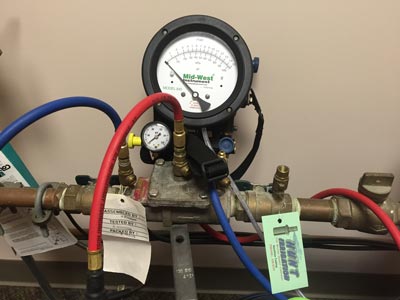Why are backflows required on an irrigation system?
 There are many instances of cross-connection hazard. To explain the risk involved, imagine that one end of a garden hose is attached to your home’s water system and the other end is placed down into a bucket of herbicide. At the same time an abrupt loss of water occurs in the main water line serving your home (such as a water main break or large volumes of water released from a fire hydrant). The pressure drop causes a reverse flow in the water line and in a system with no backflow prevention insecticide from the bucket is sucked into your home’s drinking water and potentially into the main water line serving your community. However, if the spigot your garden hose is connected to is equipped with a hose bib device, the reverse flow would cause the check in the hose bib to engage and stop the backflow at the spigot. This exact situation can occur in your irrigation backflow. Your sprinkler is constantly connected to your fresh drinking water supply, if your backflow is not maintained annually you are at risk of pulling the water from your irrigation system back into your house and contaminating the water that you and your neighbors bathe, wash dishes and drink with.
There are many instances of cross-connection hazard. To explain the risk involved, imagine that one end of a garden hose is attached to your home’s water system and the other end is placed down into a bucket of herbicide. At the same time an abrupt loss of water occurs in the main water line serving your home (such as a water main break or large volumes of water released from a fire hydrant). The pressure drop causes a reverse flow in the water line and in a system with no backflow prevention insecticide from the bucket is sucked into your home’s drinking water and potentially into the main water line serving your community. However, if the spigot your garden hose is connected to is equipped with a hose bib device, the reverse flow would cause the check in the hose bib to engage and stop the backflow at the spigot. This exact situation can occur in your irrigation backflow. Your sprinkler is constantly connected to your fresh drinking water supply, if your backflow is not maintained annually you are at risk of pulling the water from your irrigation system back into your house and contaminating the water that you and your neighbors bathe, wash dishes and drink with.
Trust Hunt Irrigation and our State Certified Grade 6 Backflow Operators to test your backflow annually and insure your irrigation system is not creeping into your house contaminating your drinking water supply.